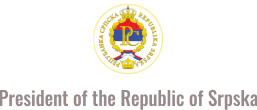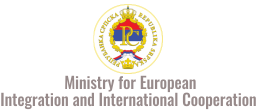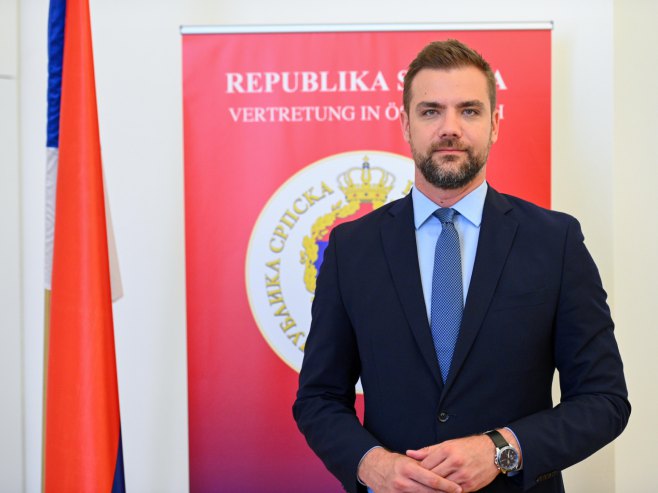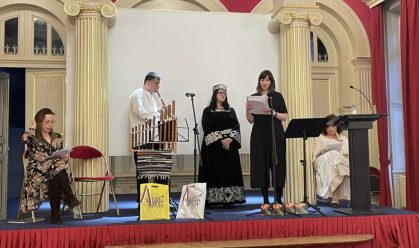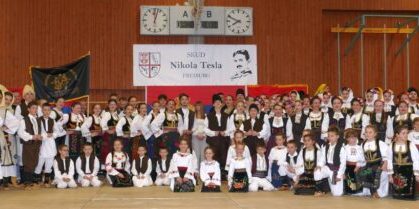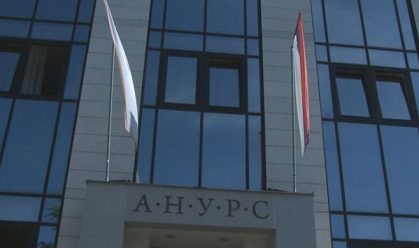The Head of the Representative Office of the Republic of Srpska in Austria, Mladen Filipović, said that the Austrian market had the greatest interest in the wood and metal sectors, but that opportunities were also opening for cooperation improvement in the fields of new technologies and process manufacturing.
Filipović noted that economic cooperation strengthening and institutional connecting remained the priority in Representation’s work, in addition to preserving Serbian cultural and national identity.
– We operate in various fields, and we seek to build partnerships that will facilitate and improve the development of Srpska. We have done a lot, but there is always room for more activities – said Filipović.
FURTHER ACTIVITIES ON CONNECTING BUSINESSMEN OF SRPSKA AND AUSTRIA
Since last year’s results were very positive, the plan for this year is to continue the Fit4Austria project, aimed at connecting businessmen from Srpska with businessmen from Austria.
– Invitations to apply will be sent out in the first quarter of this year, in coordination with the Austrian Chamber of Commerce. The goal is to connect Republic of Srpska businessmen with businessmen from Austria, establish new business contacts and perform more effectively on the Austrian market – explained Filipović.
He noted that the Representation would continue to support the promotion of tourism, but also economic potential of Srpska in Austria.
– The Tourism Fair will be traditionally held in Vienna in March, and in our presentation at this fair we will support the Tourism Organization of Srpska, which will have its own stand, and new design and branding have also been announced. In addition, we will continue to promote our tourism potentials, such as the Jahorina Olympic Center, ethno and rural tourism – Filipović said.
According to him, at the end of this year, the Representation will organize a business conference in Vienna in cooperation with the Republic of Srpska Investment Development Bank /IDB/, where Srpska will be presented as a desirable area for new investments.
FOCUSING ON SRPSKA’S INVESTMENT ADVANTAGES
– What we always emphasize are the investment advantages of the Republic of Srpska, such as favorable geographical location, infrastructure connectivity, and stimulating tax policy and business environment – said Filipović.
He expressed satisfaction with last year’s completed projects and work results, and noted that there was always room for further cooperation improvement.
– Concerning economic development, our diaspora has enormous potential. Our focus will remain on investments from the diaspora, but also on the transfer of knowledge and skills instrumental to economic development. Cooperation in the field of science and innovation, scientific exchange, mobility of researchers and innovators is also very important. These are all elements that strengthen and improve cooperation with businesses and increase competitiveness – says Filipović.
He stated that the Representation was implementing support measures for export activities of Republic of Srpska businessmen, and was actively inviting all business entities from Srpska to contact this office in order to achieve as effective access to the Austrian market as possible.
SIGNIFICANT STEP MADE IN PLACING DOMESTIC PRODUCTS ON AUSTRIAN MARKET
He stated that a significant step forward had been made last year in introducing and placing domestic food products on the Austrian market.
– Prnjavor company Mladegs pak presented a wide range of its products to consumers in the Austrian retail chain Spar, and since the second half of November last year, the products of the companies Vitaminka from Banja Luka and Vitinka from Kozluk are available in several branches of this retail chain in Vienna – Filipović said.
He also noted the importance of good cooperation between the Representation and IDB Srpska, so several meetings of this bank’s management and representatives of the Austrian economy had been organized in Vienna and Banja Luka last year.
Wineries from the Republic of Srpska were promoted at the Austrian-Serbian economic forum in Vienna, where wines of the companies Vukoje, Tvrdoš and Jungić were presented.
– The Representation organized a master class training for representatives of our wineries in order to introduce our winemakers to the specifics of the Austrian market and the potential for joining the gastronomic offer. The master class was held by Darrell Joseph, an expert in the wine market of Central and South Eastern Europe – Filipović said.
EFFORT TO BUILD PARTNERSHIP IN ALL FIELDS
He said that the Representation operated in various fields, seeking to build partnerships both in the economy and in culture, science and education.
Speaking about cultural exchange, Filipović stated that several important events had taken place last year hosting numerous writers, musicians and other artists from the Republic of Srpska in Vienna.
– In October last year, we also hosted the wards of the Banja Luka Down Syndrome Center, who performed the theater play Roko and Cicibela before the Viennese audience, and a reception was organized for a group of University of Banja Luka’s top students, who were on a study visit to Vienna – he said.
Filipović believes that the role of the diaspora is also important in preserving the identity and tradition of the Serbian people.
– It is clear that the role of the diaspora in that sphere is crucial, that is, that we can accomplish this task successfully through joint action with our institutions. This implies constant communication with representatives of the Serbian diaspora, our associations and clubs, as well as successful businessmen – said Filipović.
He believes that there is still a lot of room for strengthening these ties, especially if taking into account the fact that Serbian associations are very successful in their activities in Austria.
Filipović also noted the importance of the Strategic Plan for cooperation with the diaspora adopted by the Government of the Republic of Srpska, and expressed his belief that it would contribute to concretizing the activities and establishing a clear institutional framework for action.
Source: RTRS – SRNA
Photo: SRNA
